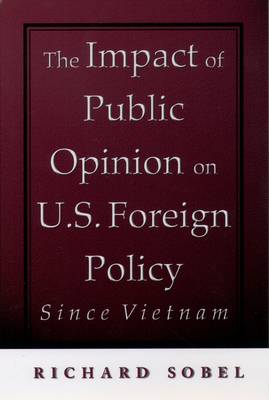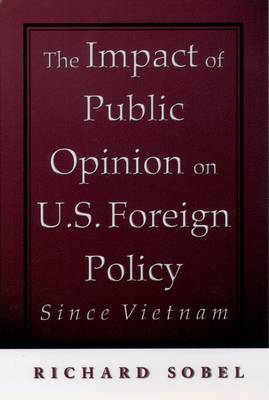
- Retrait gratuit dans votre magasin Club
- 7.000.000 titres dans notre catalogue
- Payer en toute sécurité
- Toujours un magasin près de chez vous
- Retrait gratuit dans votre magasin Club
- 7.000.0000 titres dans notre catalogue
- Payer en toute sécurité
- Toujours un magasin près de chez vous
The Impact of Public Opinion on U.S. Foreign Policy Since Vietnam
Richard Sobel
Livre broché | Anglais
200,45 €
+ 400 points
Description
How strongly does public opinion affect the making of U.S. foreign policy? In The Impact of Public Opinion on U.S. Foreign Policy Since Vietnam, Richard Sobel provides a compelling answer to this provocative question that has long stirred spirited debate among scholars, activists, and policymakers. The book explains how public attitudes have affected the making of U.S. foreign policy. It also explores the tension between theoretical views of what the role of public opinion should be in a democracy and the actual historical records. Focusing on four of the most prominent foreign interventions of the last generation--the Vietnam War, the Nicaraguan contra funding controversy, the Persian Gulf War, and the Bosnia crisis--the book demonstrates that public opinion constrained but did not set American foreign policy. The cases provide detailed information on the events, public attitudes, and policies for each of these four major U.S. conflicts. Sobel supports his argument with insights drawn from the words of decision-makers in public statements, records, and memoirs, as well as from interviews with three former secretaries of state and four former secretaries of defense. The book also explores how public sentiment about a specific crisis emerges over time and how it is often tied to the climate of interventionist and noninterventionist opinion. Clearly written, The Impact of Public Opinion on U.S. Foreign Policy Since Vietnam is an essential text for courses in American government, public opinion, political behavior, and American foreign policy. It will also have strong appeal to scholars, policy makers, and general readers who are interested in gaining a deeper understanding of the politics behind the most significant conflicts of recent times.
Spécifications
Parties prenantes
- Auteur(s) :
- Editeur:
Contenu
- Nombre de pages :
- 288
- Langue:
- Anglais
Caractéristiques
- EAN:
- 9780195105285
- Date de parution :
- 01-03-01
- Format:
- Livre broché
- Format numérique:
- Trade paperback (VS)
- Dimensions :
- 162 mm x 235 mm
- Poids :
- 408 g

Les avis
Nous publions uniquement les avis qui respectent les conditions requises. Consultez nos conditions pour les avis.






